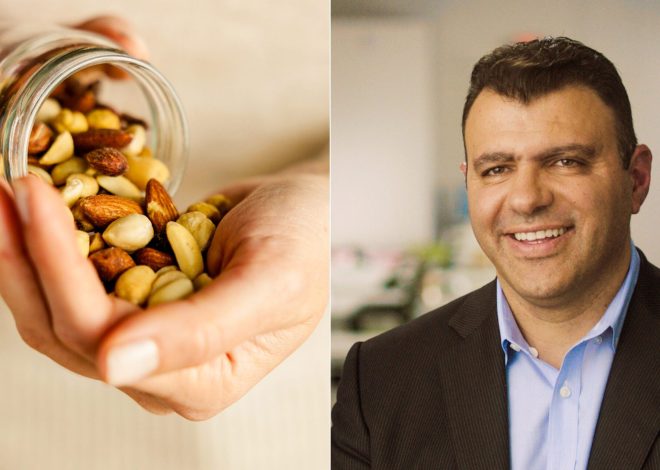
Lower cholesterol levels just by changing your lifestyle? It’s not that easy
“Lower cholesterol levels with natural remedies” is the title of many articles, guides and advertisements for nutritional supplements. However, diet and exercise cannot do much to combat high levels of so-called bad cholesterol, LDL, in the blood. “Through lifestyle, bad cholesterol can often only be reduced by five to ten percent,” says Nicolas Rodondi, chief physician of the polyclinic and lipid consultation at the University Hospital in Bern.
Read more after the Advertisement
Read more after the Advertisement
Guides promise a particularly big impact through a change in diet. “Through a Mediterranean diet, i.e. a low-meat diet with lots of fish and vegetables that are rich in unsaturated fatty acids, LDL cholesterol can be lowered,” says Stephan Baldus, Professor of Cardiology and Director of the Heart Center at the University Hospital of Cologne. “But the effect is limited.” He also speaks of a five to ten percent reduction at best. Only those who previously ate extremely unhealthily and then switched to a Mediterranean diet could achieve a greater improvement.
If the LDL cholesterol level is very high or cardiovascular disease already exists, lifestyle changes are usually not enough to sufficiently lower LDL levels.
Stephan Baldus
Cardiologist
Read more after the Advertisement
Read more after the Advertisement
A clear indication that simply consuming cholesterol in food is not decisive for the concentration of “bad” LDL cholesterol (LDL-C): Several large studies have shown that consuming a lot of cholesterol in food does not mean that you also have a lot of it in your blood. This is because 80 percent of the molecule is produced by the body itself in the liver. “If the LDL cholesterol level is very high or cardiovascular disease already exists, a lifestyle change is usually not enough to sufficiently lower LDL levels,” says Stephan Baldus. “Medication is then required for this.”
Statins reduce the risk of heart attack
The “Healthy Heart Act”, which, according to Federal Health Minister Karl Lauterbach, is due to come into force in the third quarter of 2025, could bring about improvements here – by giving more people access to cholesterol-lowering drugs, so-called statins. These substances inhibit an enzyme that is used to synthesize LDL, primarily in liver cells. On the one hand, the inhibition directly reduces the amount of LDL. On the other hand, the lack of LDL causes the cells to form more LDL receptors, which then remove more LDL from the blood. Most recently, a large meta-analysis found that statins reduce the risk of heart attack in people with risk factors by 85 percent.
“Until now, we have only been able to treat patients with a ten-year risk of over 20 percent with statins, which is a fairly high risk,” says Oliver Weingärtner, Professor of Interventional Cardiology, Angiology and Lipidology at Jena University Hospital. “With previous legislation, we have excluded many patients from this effective and well-tolerated therapy. That is why reducing the risk at which statins can be prescribed makes sense.”
Medicines are inexpensive
The law is due to come into force in 2025, but those affected should already have little trouble obtaining such medication. “Prescribing statins has not been difficult so far, partly because these medications are very inexpensive,” says Ulrich Laufs, Director of the Clinic and Polyclinic for Cardiology at Leipzig University Hospital. “Statins are among the best-researched medications. It has been scientifically proven that lowering cholesterol with statins reduces the risk of heart attacks and other cardiovascular diseases.”
Read more after the Advertisement
Read more after the Advertisement
In addition to statins, there is an active ingredient called ezetimibe that inhibits the absorption of cholesterol from food in the small intestine. Studies have shown that its combination with a statin lowers LDL levels – and at the same time the risk of cardiovascular events. Other active ingredients that lower LDL levels also reduce the risk of heart attacks: for example, bempedoic acid and antibodies that block the enzyme PCKS9. The new drug inclisirian also works against PCKS9 – by blocking its messenger RNA.
Different LDL target values
Despite the wide range of options for lowering cholesterol with medication, surveys have shown that even high-risk patients in this country often had LDL levels that were twice as high as recommended – and the majority of the population has an LDL concentration in their blood that is beyond the limit.
A brochure from the German Heart Foundation states: “For everyone, an LDL target value of less than 115 mg/dl (less than 3 mmol/l) should be aimed for. If the overall cardiovascular risk is high, an LDL cholesterol target value of less than 70 mg/dl (less than 1.8 mmol/l) should be aimed for. This group includes, for example, people with severe high blood pressure, genetically determined high cholesterol levels or smokers. If the overall cardiovascular risk is very high (for example, if you have diabetes or already have cardiovascular disease), an LDL target value of less than 55 mg/dl (less than 1.4 mmol/l) should be aimed for.”
“We have excellent drugs to lower LDL,” says Baldus. “Today, the biggest problem is that we cannot reach many people with high LDL levels – these people live with a constant risk of heart attack and stroke that could be very easily alleviated with well-tolerated drugs.”
Read more after the Advertisement
Read more after the Advertisement
High-fat diet not recommended
Medication is therefore urgently needed for many, but that does not mean that a change in lifestyle is pointless. “A high-fat diet leads to increased cholesterol levels and we strongly advise against it,” says Stephan Baldus. Fatty foods increase the LDL level indirectly, namely through the amount of saturated fats that people consume. These are particularly found in red meat, poultry with skin, butter, palm oil and coconut oil.
This could be linked to the misconception that eggs in particular are bad for our cholesterol levels. Europeans and Americans who eat a lot of eggs do have a higher risk of heart disease than people who eat fewer eggs in these regions of the world. However, this connection does not hold in Asia. This suggests that people in Europe and the USA who eat a lot of eggs have an overall unhealthier lifestyle. This could start with the preparation of the eggs: if they are fried or even eaten with bacon, consumers consume a lot of saturated fats along with the egg. In Asia, on the other hand, eggs are often eaten raw or pickled – and therefore without any additional saturated fatty acids.
Fried in a pan or pickled? It all depends on how the eggs are prepared.
Source: Soeren Stache/dpa
Regardless of cholesterol levels, the following also applies: “A Mediterranean diet reduces the risk of a heart attack by up to a third,” says Nicolas Rodondi from the University of Bern. Physical activity also makes a greater contribution to health than laboratory values have shown so far. It has long been known that a high concentration of so-called “good” cholesterol (HDL) reduces the risk of cardiovascular disease. The amount of HDL can be increased through exercise – and physical activity has been proven to reduce the risk of cardiovascular disease.
But all attempts to achieve this effect with medication have so far failed. “Exercise releases enzymes in the blood vessels,” says Martin Halle, Professor and Medical Director for Preventive Sports Medicine at the Klinikum rechts der Isar, the university hospital of the Technical University of Munich. “These dock in the liver and muscles, changing the cholesterol particles into cholesterol and blood fats that are less damaging to blood vessels.” Proper nutrition and sufficient exercise are therefore beneficial to the cardiovascular system – even without having a major impact on cholesterol levels.

Ethel Purdy – Medical Blogger & Pharmacist
Bridging the world of wellness and science, Ethel Purdy is a professional voice in healthcare with a passion for sharing knowledge. At 36, she stands at the confluence of medical expertise and the written word, holding a pharmacy degree acquired under the rigorous education systems of Germany and Estonia.
Her pursuit of medicine was fueled by a desire to understand the intricacies of human health and to contribute to the community’s understanding of it. Transitioning seamlessly into the realm of blogging, Ethel has found a platform to demystify complex medical concepts for the everyday reader.
Ethel’s commitment to the world of medicine extends beyond her professional life into a personal commitment to health and wellness. Her hobbies reflect this dedication, often involving research on the latest medical advances, participating in wellness communities, and exploring the vast and varied dimensions of health.
Join Ethel as she distills her pharmaceutical knowledge into accessible wisdom, fostering an environment where science meets lifestyle and everyone is invited to learn. Whether you’re looking for insights into the latest health trends or trustworthy medical advice, Ethel’s blog is your gateway to the nexus of healthcare and daily living.



